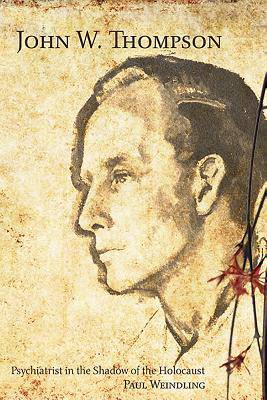
Bedankt voor het vertrouwen het afgelopen jaar! Om jou te bedanken bieden we GRATIS verzending (in België) aan op alles gedurende de hele maand januari.
- Afhalen na 1 uur in een winkel met voorraad
- In januari gratis thuislevering in België
- Ruim aanbod met 7 miljoen producten
Bedankt voor het vertrouwen het afgelopen jaar! Om jou te bedanken bieden we GRATIS verzending (in België) aan op alles gedurende de hele maand januari.
- Afhalen na 1 uur in een winkel met voorraad
- In januari gratis thuislevering in België
- Ruim aanbod met 7 miljoen producten
Zoeken
€ 151,45
+ 302 punten
Omschrijving
John W. Thompson: Psychiatrist in the Shadow of the Holocaust is the biography of a doctor whose revulsion at Nazi human experiments prompted him to seek a humane basis for physician-patient relations. As a military-scientific intelligence officer in 1945, Thompson was the first to name "medical war crimes" as a category for prosecution. His investigations laid the groundwork for the Nuremberg medical trials and for the novel idea of "informed consent." Yet, Thompson has remained a little-known figure, despite his many scientific, literary, and religious connections. This book traces Thompson's life from his birth in Mexico, through his studies at Stanford, Edinburgh, and Harvard, and his service in the Canadian Air Force. It reconstructs his therapeutic work with Unesco in Germany and his time as a Civil Rights activist in New York, where he developed his concept of holistic medicine. Thompson was close to authors like Auden and Spender and inspirational religious figures like Jean Vanier, founder of L'Arche. He drew on ideas of Freud, Jung, and Buber. The philosophical and religious dimensions of Thompson's response to Holocaust victims' suffering are key to this study, which cites accounts of psychiatrists, students and patients who knew Thompson personally, war crimes prosecution records, and unpublished personal papers. Paul Weindling is Wellcome Trust Research Professor at the Centre for Health, Medicine and Society: Past and Present, Oxford Brookes University, UK.
Specificaties
Betrokkenen
- Auteur(s):
- Uitgeverij:
Inhoud
- Aantal bladzijden:
- 456
- Taal:
- Engels
- Reeks:
- Reeksnummer:
- nr. 17
Eigenschappen
- Productcode (EAN):
- 9781580462891
- Verschijningsdatum:
- 1/09/2010
- Uitvoering:
- Hardcover
- Formaat:
- Genaaid
- Afmetingen:
- 160 mm x 231 mm
- Gewicht:
- 793 g

Alleen bij Standaard Boekhandel
+ 302 punten op je klantenkaart van Standaard Boekhandel
Beoordelingen
We publiceren alleen reviews die voldoen aan de voorwaarden voor reviews. Bekijk onze voorwaarden voor reviews.









